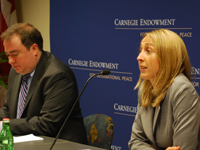Registration
You will receive an email confirming your registration.
IMGXYZ3608IMGZYXYemen’s power structures are under great strain as the political elite struggles to adapt to nationwide demands for a more legitimate, responsive, and inclusive government. Saudi Arabia and the Gulf states—which have significant financial resources and strong cultural ties to Yemen, as well as important informal connections—will play a critical role in Yemen’s future. A new Chatham House briefing paper, “Yemen, Saudi Arabia, and the Gulf States: Elite Politics, Street Protests, and Regional Diplomacy,” examines this complex relationship against the backdrop of the Arab Spring.
Ginny Hill, Associate Fellow for the Middle East and North Africa Programme at Chatham House, discussed the issues in the paper. Carnegie’s Christopher Boucek moderated.
Forces of change in Yemen
- Grassroots uprising: In January 2011, public frustration with elite corruption and an aging authoritarian regime erupted in massive but largely non-violent street protests in the capital of Sana’a and other cities. Protesters initially advocated limited political reforms but, faced with the regime’s intransigence and increasingly repressive security crackdown, they gradually escalated their demands to call for the resignation of longtime President Ali Abdullah Saleh and a complete restructuring of the existing political system.
- Elite power struggle: Growing unrest has inflamed longstanding tensions between political and tribal elites, as Yemen’s most powerful stakeholders compete for influence in shaping the trajectory of the transition to a post-Saleh system. As former Saleh loyalists, such as General Ali Mohsin al-Ahmar, defect from the regime and publicly back street protests, existing coalitions and alliances are being dramatically reconfigured.
Channels of influence
- Saudi patronage: Saudi Arabia views instability in Yemen as a direct threat to its own national security, and deploys diplomatic and financial mechanisms to exercise influence over the political scene in Sana’a, Hill said. Until recently, the Saudi government dispensed billions of dollars in annual payments to Yemeni political elites through its Special Office for Yemen Affairs. These payments were abruptly terminated in April, most likely due to the deteriorating health of Crown Prince Sultan—the Saudi official overseeing the office—and Riyadh’s frustration with the increasingly volatile security situation in Yemen.
- Informal networks: Beyond official patronage distributed through formal, institutional channels, Saudi Arabia enjoys considerable influence over Yemen’s political landscape through private donors and Islamic charity organizations, Hill added.
- GCC mediation: The Gulf Cooperation Council (GCC) is working intensively to negotiate a political agreement between Saleh and the Joint Meeting Parties (JMP) opposition bloc, but the talks have stalled over the president’s persistent refusal to step down. The GCC-brokered plan for political transition would grant Saleh legal immunity from prosecution in exchange for his resignation within 30 days. As negotiators struggle to bring an end to the paralyzing political stalemate, Saleh “has consistently raised and disappointed people’s expectations” by stating his readiness to accept a deal but backing out at the last minute, according to Hill.
- Private-sector funding: Private Yemeni donors are leveraging substantial resources to influence the current political transition, Hill said. Hamid al-Ahmar, a key leader in the Islah opposition party and an important figure in Yemen’s largest tribal federation, has used his multi-million dollar fortune and mobile phone franchise to mobilize anti-government protests.
The future political landscape
As Saleh’s 32-year-old regime begins to disintegrate, Yemen faces an uncertain political future. Although the United States and Gulf countries have cautiously endorsed popular demands for Saleh’s removal, there is widespread fear that the dismantling of the current system will give rise to an “increasing level of chaos and disorder,” Hill said.
- Evolving tribal structures: Yemen’s traditional tribal system is evolving due to generational shifts and the fragmentation of the alliance system built by Saleh, Hill explained. The urban-based youth activists coordinating street protests are increasingly motivated by economic and political grievances rather than loyalty to tribal federations.
- Economic instability: Boucek warned that Yemen’s “looming economic meltdown” will present serious obstacles to the restoration of political stability. Tribal sabotage of vital oil installations in Yemen’s interior has interrupted an important source of revenue, forcing Yemen to buy refined petroleum from Saudi Arabia. Food scarcity and rising inflation are imposing additional strain on an already volatile society.
- New political players: Street protests were largely coordinated by independent youth activists, rather than the established opposition. Youth leaders who operate outside of the formal political process have emerged as decisive players in Yemen’s ongoing transition. While it remains unclear whether or not they will seek a role in formal political institutions, Hill predicted that these young, rising leaders “will affect the long-term trajectory of the country.”
- A resurgent GPC?: Saleh’s ruling General People’s Congress (GPC) Party faces the loss of its longtime leader, but will undoubtedly continue to play a role in Yemen’s political system, Hill added. The party will likely adapt to public pressures for reform by recruiting new leadership and reinventing its political agenda.
